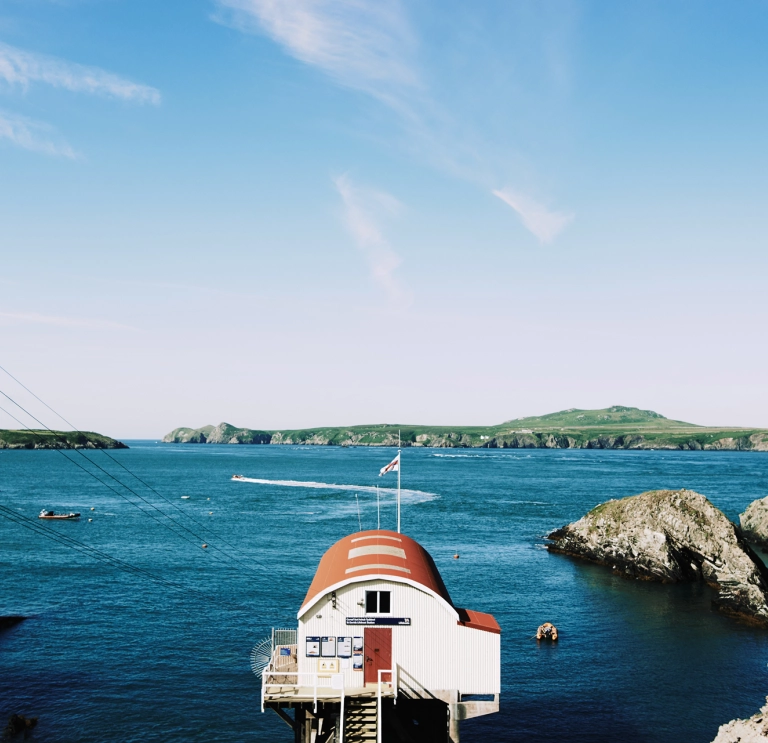Here are some top tips from the RNLI on how to have fun, stay safe, and be Adventure Smart along our epic Welsh coast this summer.
Choose a lifeguarded beach
Beach bag, swimsuit, towel and suncream at the ready. RNLI lifeguards patrol 37 award-winning beaches across Wales where trained professionals are on hand to keep you safe in and out of the water. They monitor the sea conditions, offer safety advice and keep an eye on you, your family and friends having fun on the beach.
Did you know the safest place to swim or bodyboard is in between the red and yellow flags? Black and white chequered flags mean that the area is safe for watercraft such as kayaks or surfboards. A red flag means danger – do not enter the water. Find a list of all RNLI lifeguarded beaches on their website.


Check tide times before you set off
Wales’ south east coast has one of the highest tidal ranges in the world. There are also spectacular tidal islands to explore across Wales such as Worm's Head, Ynys Llanddwyn and Sully Island to name a few. Some of our stretches of golden sands with their dramatic coves and inlets can seem like vast playgrounds, and a walk of discovery to a tidal island can feel like something out of the Famous Five, but remember, the tide can come in surprisingly quickly.

Don’t get caught out. Always check tide times before you set off, seek local information about where you’re heading, look out for safety signage and let someone know when to expect you back. Carry a mobile phone and call 999 or 112 and ask for the Coastguard in an emergency.
Be prepared
Whether you’re a sandcastle builder, surfer or sailor, keep your energy levels up by carrying a supply of food and drink. If you’re making a day of it mix together sand, sea and sausages with a beach barbeque, or enjoy the taste of coastal Wales at some of our best beach restaurants and street food pop ups.
Sunburn or sunstroke can also ruin your day. Pack the sun cream, sun hat and sunglasses and seek shade particularly during the hottest part of the day. And please don’t forget to take away your litter.
A world of wildlife – look, don’t touch
Our Welsh beaches are among the cleanest beaches in Britain. And we’re not just saying that. We’ve got the Blue Flags to prove it. Our coast is also spectacularly beautiful and rich in wildlife. Exploring the seashore is fantastic fun for all the family. You can find a new world of wildlife in shallow pools among boulders and sands.
While most creatures are harmless, weeverfish, jellyfish and sea anemones are common finds that will cause a painful injury, so please remember to look and not touch. Ask a lifeguard if you’re not sure.
Know your limits
Powerful breaking waves have the potential to bring out the big kid in all of us. They are one of the most exciting and impressive features of our Welsh coastline especially at adrenaline-fueled beaches such as Whitesands, Newgale and Hell’s Mouth. Always stay mindful of your own limits and experience, waves can easily knock you off your feet. Be aware of rips which are the strong currents running out to sea. Did you know a rip current can move at 4.5mph? That’s faster than an Olympic swimmer. When the sea conditions are rough, enjoy the power of the water and waves from a safe and respectful distance.
Respect the water: If you’re caught in a rip current, don’t panic or try to swim against it. If you can, stand and wade. If you can’t stand, swim parallel to the shore, raise your hand and shout for help.

Think about weather conditions and gear
The Welsh coastline always looks ready for an adventure no matter what the weather, but even if the sun is shining, the sea around the Welsh coast is always much colder than it looks. If you’re planning on enjoying the water, check the sea and weather conditions – including water temperature – before heading out. Wear a wetsuit of appropriate thickness for the temperature and type of activity you’re doing. Wear a lifejacket or buoyancy aid (for kayaking, boating etc.) and don’t forget to carry the appropriate means of calling for help. You can find lots of useful advice on what gear you need on the Adventure Smart website.
Respect the water: If you fall unexpectedly into cold water, fight your instinct to thrash around or swim hard. It’s best to relax and float on your back to catch your breath. Once the cold water shock has passed, call for help, find something buoyant to hold on to, or swim for safety if you’re able to. Visit the RNLI respect the water page to find out more.
Weather forecast and tide times can be found on the Met Office website. You may also find the surf forecast information of help.

Let the experts show you the way
Wales comes well equipped for outdoor adventure. If you’re trying out a new coastal activity, why not go with a qualified guide or sign up for a taster session first? You’ll find surf schools, coasteering experiences, coastal walking holidays, kitesurfing tuition and more. It’s the perfect way to gain confidence, to try out kit and equipment, and to learn how to experience the activity safely. Find your next coastal adventure.


Know how to call for help
Would you know what to do if you saw someone (even if it’s a four-legged friend) in trouble at the coast? As difficult as it might be to fight the instinct to go in after them, our advice is to tell a lifeguard or dial 999 or 112 and ask for the coastguard.
No matter if you’re walking along the coast, angling from rocks, out on your kayak, or sailing further out to sea, having the means to call for help in an emergency can be the difference between life and death. In most cases, a mobile phone can be enough to call for help. But is your mobile phone protected if you unexpectedly found yourself in the water?
If you are out on the water or further offshore, you might not be able to get a signal on your mobile. More specialist equipment may be needed to ensure that, if an accident happens and you find yourself in danger, you can alert the authorities and have them come rescue you. Find out more about how to call for help at sea on the RNLI website.
If you want to help, try shouting instructions about how to float, or find something buoyant to throw towards them to help keep them above water. Do not enter the water without the correct training, experience or equipment.





